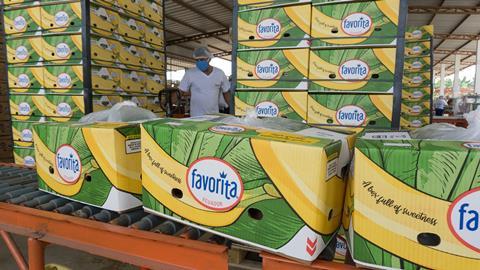Aebe says data undermine EU supermarket claims that consumers will not pay more for bananas

Ecuadorean banana exports to the US have increased this year in spite of President Trump’s new tariffs.
In an interview with EFE, José Antonio Hidalgo, executive director of the Association of Banana Exporters of Ecuador (Aebe), said shipments to the US had increased by 8.39 per cent in volume since the beginning of 2025 compared to the year-earlier period, despite the 10 per cent tariff imposed by the Trump administration in April, which rose to 15 per cent in August.
Exporters point out that the fact that demand has grown despite rising prices undermines the ultra low-price policy of European supermarkets for this product.
Speaking during the recent Banana Time 2025 convention in Guayaquil, Hidalgo said: “US supermarkets have passed this cost on to the end consumer, and the end consumer continues to consume far more bananas than any other fruit”.
Through July of this year, Ecuadorean banana exports to the US reached a value of US$377mn, 14.6 per cent more than in the same period of 2014. The US market is Ecuador’s fourth most important market after the European Union, Russia, and the Middle East.
“We’ve realised that, after passing on those costs, we weren’t negatively impacted; we actually saw an increase, and that’s the message for Europe,” Hidalgo said.
“We have to stop being the cheapest fruit on the shelves in Europe, and that’s part of the responsibility supermarkets have toward the consumer.”
He added that bananas “are a product that should be sold based on the ethical stories behind the efforts in sustainability, safety, and quality”.
Hidalgo praised Aldi’s participation in Banana Time 2025, where the retailer explained its new sustainable sourcing policy which involves long-term contracts to ensure a fair price for the end consumer, noting that he hoped more supermarkets would follow Aldi’s lead.
Analysing Ecuador’s potential to expand its presence in Asia, Hidalgo said the industry was well-positioned to increase shipments to China, South Korea, and Japan as tariffs in these countries continue to be reduced.
He pointed to the example of South Korea, where the government temporarily reduced tariffs on Ecuadorean bananas from 30 per cent to 0 per cent for one year, during which time exports to that market grew by 200 per cent.
In 2024, Ecuadorean banana exports to South Korea reached US$46mn, compared to US$15mn in 2023. Shipments to July 2025, totalled US$33mn, a 23 per cent increase over the same period in 2024.
Aebe said it is confident that a similar trend will occur with China, where a free trade agreement with Ecuador has been in effect since 2024. This agreement establishes a reduction in tariffs of one percentage point per year until reaching 0 per cent in 2034.



